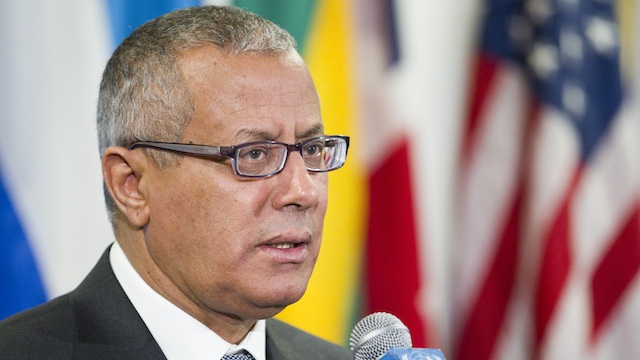SUMMARY
This is AI generated summarization, which may have errors. For context, always refer to the full article.

TRIPOLI, Libya (2ND UPDATE) – Libyan Prime Minister Ali Zeidan was freed Thursday after being held by gunmen for several hours, in the latest sign of the country’s lawlessness since Moamer Kadhafi’s 2011 overthrow.
The premier appeared in good health when he arrived at government headquarters after his ordeal at the hands of former rebel militiamen, waving to waiting well-wishers as he climbed out of an armoured car.
“I hope this problem will be resolved with reason and wisdom” and without any “escalation,” Zeidan said later in comments broadcast by state television as he left the cabinet meeting.
The pre-dawn seizure of Zeidan came 5 days after US commandos embarrassed and angered Libya’s government by capturing senior Al-Qaeda suspect Abu Anas al-Libi off the streets of Tripoli and whisking him away to a warship in the Mediterranean.
Foreign Minister Mohammed Abdelaziz said Zeidan had been freed a number of hours after being seized before dawn at his Tripoli hotel.
“He has been freed but we have no details so far on the circumstances of his release,” Abdelaziz told AFP.
The premier had moved into the hotel for security reasons.
Government spokesman Mohamed Kaabar told the state LANA news agency that the premier had been “freed, not released,” without providing further details.
Moments before news broke that Zeidan had been freed, Deputy Prime Minister Al-Seddik Abdelkarim had vowed that the government would not give into the demands of the perpetrators of a “criminal act.”
“The government will not give in to blackmail by anyone,” he said.
Zeidan, who made no immediate comment when he arrived at government headquarters, went straight into a meeting with his ministers and members of the General National Congress (GNC) — Libya’s highest political authority.
Ministers had already met in his absence earlier in the day for an emergency session convened after his abduction.
A government statement said Zeidan had been taken “to an unknown destination for unknown reasons by a group” of men believed to be former rebels.
The Operations Cell of Libyan Revolutionaries, former rebels who had roundly denounced Libi’s abduction and blamed Zeidan’s government for it, said it had “arrested” Zeidan under orders from the public prosecutor.
But the cabinet said on its Facebook page that ministers were “unaware of immunity being lifted or of any arrest warrant” for the premier.
Later, another group of ex-rebels, the Brigade for the Fight against Crime, said it was holding Zeidan, according to the official LANA news agency.
The government said it suspected both groups of being behind Zeidan’s abduction.
The two groups loosely fall under the control of the defence and interior ministries but largely operate autonomously.
Two years after the revolution that toppled Kadhafi, Libya’s new authorities are struggling to rein in tribal militias and groups of former rebels.
A country awash with weapons
Many Libyans blame political rivalries for the problems plaguing a country awash with militias and weaponry left over from the 2011 rebellion.
Zeidan, who was named prime minister a year ago, had on Tuesday condemned the US capture of Libi in Tripoli and insisted that all Libyans should be tried on home soil.
The GNC has demanded that Washington “immediately” hand back Libi, claiming his capture was a flagrant violation of Libyan sovereignty.
Libi — whose real name is Nazih Abdul Hamed al-Raghie — was on the FBI’s most wanted list with a $5 million (3.7 million euro) bounty on his head for his alleged role in the 1998 twin bombings of US embassies in East Africa.
He is reportedly being held aboard a US Navy ship in the Mediterranean.
US President Barack Obama on Tuesday said Libi was involved in plots that killed hundreds of people and would be brought to justice.
Public anger in Libya is growing as widespread violence — including political assassinations — proliferates, particularly in the east of the country.
A number of foreign missions have come under attack in Tripoli and in the eastern city of Benghazi, the cradle of the 2011 revolution.
On September 11, 2012, 4 Americans, including the ambassador, were killed when militants swarmed into the US consulate in Benghazi. – Rappler.com
Add a comment
How does this make you feel?
There are no comments yet. Add your comment to start the conversation.